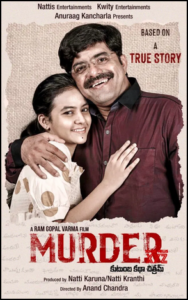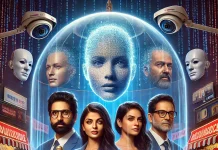Recently, the Telangana High Court, while hearing an appeal filed by Ram Gopal Varma observed that the right to privacy does not apply to incidents which are already in Public domain.
In this article, we attempt to take a closer look at the present case and the existing jurisprudence in India with regards to Right to Privacy in case of events which are already in public domain.
The present case was filed by appellant Ram Gopal Varma for the release of his film, which is based on the murder of the respondent/ plaintiff Amrutha’s husband Pranay Perumalla. Amrutha fell in love and married a dalit youth Pranay Perumalla against her father, Maruthi Rao’s wishes. Her father had repeatedly asked her to come back to his house but she refused. She later got pregnant and had gone for medical check-up at a hospital which is close to her matrimonial home on 14.09.2018 accompanied by her husband and mother-in law and after they came out of the hospital, her husband was attacked and stabbed with a knife several times and he died on account of said injuries. Subsequently, Police filed an FIR against Sri Maruthi Rao, her father and others for the murder of Pranay. The whole case was quite publicised and was covered by various newspapers and news channels.
In the present case, the plaintiff/ respondent alleges that the appellants, without her consent, collected the real life story, photographs and videos of herself and her husband, late Pranay Kumar, and also of her father, late Maruthi Rao, from various sources illegally with a dishonest intention to cause insult and to defame her in public; and basing on the said information, the appellants had decided to start making a film by the name “Murder”. She alleged that the appellant, Ram Gopal Varma in his various social media posts and while releasing the poster of the movie said that it was based on the true story of the respondent and her deceased husband, Pranay, and her deceased father, Maruthi Rao, without taking the consent of the family members of the deceased and the respondent. She contended that such needless publicity made by the appellants attracted a range of public opinion, seriously prejudicing her private life and causing her much sorrow. She said that the actions of the appellant invaded her privacy and that the appellants do not have any manner of right to do so, that it affects her private life, and her ‘right to privacy’ is a part of her ‘right to live’. She further stated that the appellants in any event, could not have made the movie without taking her consent and ought to be restrained from releasing the same. She also filed a temporary injunction restraining the appellants from releasing, publishing, exhibiting publicly or privately, selling, promoting, advertising or recreating in the forms of drama or serial or any other literary or artistic expression in respect of Pranay, particularly, the proposed motion picture in the name of “Murder” made on the life of the respondent, till the disposal of the suit.
The appellants/ respondents on the other hand argued that that they need not take permission of the respondent for making fictional cinematographic film and the material on record shows that the movie being made by the appellants was based on the true story of the respondent, her deceased husband and her deceased father. They further stated that the movie was being made on the basis of the news in the public domain and not any individual’s true story as such.
Initially, the trial court had held that the film being made on an individual’s life has a serious impact on the right of privacy of the individual and their family members. It also noted that a criminal case relating to the killing of the respondent’s deceased husband was pending before a Criminal Court for trial and so the respondent was entitled to grant of interim injunction prayed by her against the appellants.
The Telangana High court, however, differed as it stated that the events (i.e. honour killing) which have occurred in the life of the respondent are not in that sense unique to her and to her family alone. It further observed that a person undoubtedly has a right to privacy in relation to her family, marriage, procreation, motherhood and child-bearing and none can publish anything concerned with these matters without his/her consent. However, the court pointed out the exception to the above that is, any publication concerning these aspects would become unobjectionable if such publication is based upon public records including court records. In other words, once the matter becomes a matter of public record, the right to privacy is no longer subsisting and it becomes a legitimate subject for comment for press and media among others. It noted that when the events which occurred in the life of the respondent are already in public domain, she cannot plead any violation of right of privacy by the appellants in making a movie based on such events. The court, however, did caution the appellants from using respondent’s name on any social media or anywhere else while promoting the movie.
One of the cases which was heavily relied upon in the above mentioned case was R. R. Gopal and others v. State of Tamil Nadu and others [1994(6) SCC 632]. In this 1994 judgement delivered by the Supreme Court, it was held the right to privacy is implicit in the right to life and liberty guaranteed to the citizens of this country by Article 21. It is a “right to be let alone”. It noted that a citizen has a right to safeguard his/her privacy and none can publish anything concerning the individual’s private life without his consent whether truthful or otherwise and whether laudatory or critical. If he does so, he would be violating the right to privacy of the person concerned and would be liable in an action for damages. The same judgement also mentioned the exception to the right of privacy and noted that any publication concerning an individual’s private life becomes unobjectionable if such publication is based upon public records including court records.
The judgment in R.Raja Gopal’s case has also been upheld in the landmark case of K.S.Puttaswamy(Retd) and Anr. Vs Union Of India and Anr [(2017) 10 SCC 1]
It is important to note that similar issue with respect to right to privacy has been observed recently in the case of Harper Collins Publishers India Pvt Ltd v. Sanchita Gupta Shilpi and ors where Harper Collins had appealed to the Delhi High against injunction on the publication of the book “Gunning for the Godman: The Story Behind Asaram Bapu‘s Conviction” Sanchita Gupta had sought an injunction as the book allegedly contained defamatory material and invaded her right to privacy. The appellant argued that the book is based upon the evidence discussed in the judgment convicting her of the crimes she was charged with and therefore, the proven facts are a matter of public record. The Delhi HC, set aside the injunction granted by the trial court and observed “It would be against the principles of free speech to debar all discussion on a subject, especially regarding a court verdict which is available in the public domain. However, the right to reputation comes before the right to discuss an issue. If there is fair discussion, which is based on established facts and which ex facie is not malicious, there can be no bar on the discussion/publication.”
Even in the instance of multiple law suits filed for stalling the release of its series “Bad boy Billionaires,” Netflix had argued that the docu-series consist of “facts, information, footage, and snippets pertaining to the billionaires, which information is available in the public domain and/or is in the public knowledge”.
In case of M/S. Super Cassettes Industries v. Nandi Chinni Kumar, Nandi Chini Kumar alleged infringement of his copyright agreement with Akhilesh Prakash Paul where Nandi Chini Kumar acquired Akhilesh Paul’s life rights to make a movie on the same (Our earlier post covering this case is here). One of the arguments by T series in the present case was that they are entitled to use the said information and/or incidents which are readily available in the public domain in relation to projecting their story and incorporating it in the film in relation to Vijay Barse. The Telangana High Court upheld the lower court’s view that in this case was of the view that subject matter being in public domain or not, is the controversial aspect in the case and that the observations relating to the matter being in public domain would apply in regard to the right of privacy, but they cannot be applied in relation to copyright infringement; that even according to the defendants their movie story was not available in public domain; and even incidental reference of character of Akhilesh Prakash Paul at the present stage would be unlawful copying of the plaintiff/ respondent’s original. The Telangana High Court noted the fact that Akhilesh Prakash Paul had sold his personality rights to the plaintiff exclusively and therefore the defendants/ appellants prima facie violated the Plaintiff’s rights through making the movie “Jhund”.
It is important to note that personality rights in India are not defined under any separate statutory law but rather finds its origins in judicial precedents set by ICC Development (International) Ltd. vs. Arvee Enterprises[2003 (26) PTC 245], TITAN Industries vs. M/s Ramkumar Jewellers[2012 (50) PTC 486 (Del)] etc. With trend of making movies, publication of books and documentaries being made on famous people are on a rise, it is high time and imperative to define and address the ambiguity pertaining to Personality rights and Right to privacy in India especially with respect to Copyright Act.
Image source : here












